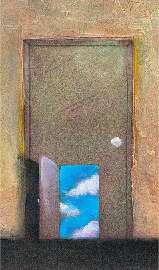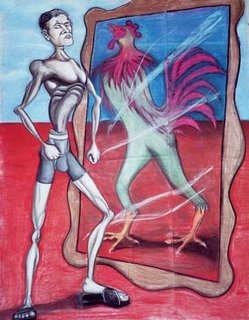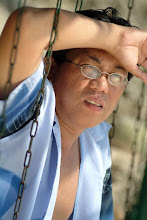Letters in All Writing Systems Traced Back to Nature, according to Yahoo News dated today (26th of April, 2006) THE SHAPES OF LETTERS in all languages are derived from common forms in nature, according to a new hypothesis.
THE SHAPES OF LETTERS in all languages are derived from common forms in nature, according to a new hypothesis.
The idea, in some ways seemingly obvious and innately human, arose however from a study of how robots see the world.
Robots employ object recognition technology to navigate a room by recognizing contours. A corner is seen as a "Y," for example, and a wall is recognized by the L-shape it makes where it meets the floor.
"It struck me that these junctions are typically named with letters, such as 'L,' 'T,' 'Y,' 'K,' and 'X,' and that it may not be a coincidence that the shapes of these letters look like the things they really are in nature," said Mark Changizi, a theoretical neurobiologist at the California Institute of Technology.
 Changizi and his colleagues think letters and symbols in Chinese, Latin, Persian, and all 97 of the other writing systems that have been used through the ages have shapes that humans are good at seeing.
Changizi and his colleagues think letters and symbols in Chinese, Latin, Persian, and all 97 of the other writing systems that have been used through the ages have shapes that humans are good at seeing.
"Evolution has shaped our visual system to be good at seeing the structures we commonly encounter in nature, and culture has apparently selected our writing systems and visual signs to have these same shapes," Changizi said.
The idea is put forth in The American Naturalist magazine.
Changizi notes that a basic shape such as "L" can be easily bent to form a "V." He found 36 shapes that require just two or three contours, and he then correlated these shapes to common scenes in nature and in ancient architecture.
"So the figures we use in symbolic systems and writing systems seem to be selected because they are easy to see rather than easy to write," he concludes. "They're for the eye."
Even graphic art that is not necessarily alphabet-based conforms to the idea. 
"Company logos, for example, are meant to be recognized, and we found that logos have a high correlation," Changizi said. "Shorthand systems, which are meant to give a note-taker speed at the expense of a commonly recognizable system of symbols, do not."
 (A lecture-testimony to the fellows of the 2nd Lamiraw Creative Writing Workshop in Calbayog City, Samar, 22-24 September 2005)
(A lecture-testimony to the fellows of the 2nd Lamiraw Creative Writing Workshop in Calbayog City, Samar, 22-24 September 2005)
ON THE WAY to this workshop, there was no turning back to the facts revealed in the headlines of Cebu's newspapers: A policewoman stationed at the Women's Desk (where the complaints of abused women are heard) was murdered by her own husband. A 12-year-old girl was also killed after her own father and her uncle allegedly took turns raping her. Masked men, in vigilante fashion, remained on the loose after leaving corpses of suspected criminals. Meanwhile, the governor of Cebu had joined the Cardinal's call for an end to the bloodshed between two warring fraternities. On the political front, the city mayor and a congressman from an adjacent city were locked in a squabble on jurisdiction over a reclaimed strip of real property. Elsewhere, of course, the primetime news had been cranking up cliches ad nauseam about the doggone state of our nation: leadership crisis, the circus in Congress, a ping-pong of allegations about corruption, protests galore, and restlessness about an impending oil price increase. 
These news, come to think of it, are a rehash of a reality reported in newspapers, say, twenty years ago. The personalities may have changed, but the circumstances remain. Talk about bad news, and there's really nothing new about this notion of badness under the sun: rotten politics, reckless policies, regrettable interpretation on the concept of public service.
Obviously, some lessons we were supposed to know in kindergarten have been outgrown or, worse, forgotten. From these horrible happenings, certainly, we have not yet learned. Or how come we seem cursed to repeat all these things too bad and too boring as they remain true in our times. Strange, indeed, in the face of this so-called enlightened times in the summit of human achievement, in this era of information technology. So strange that the recurrence of this phenomenon patent in our headlines and primetime scoops might as well be the contents of the X-Files any Martian gone astray on earth would contemplate as an interesting subject for an essay on the human condition.
That we are apparently trapped in this vicious cycle worthy of any struggling writer's indignation, that we are running in circles, indicates a failure of imagination. That we appear stuck and trapped in a labyrinth means we have not yet found the way out of the dark. That, indeed, the idea of transcendence and breaking through barriers remain fancy notions devoutly to be wished despite our inventions, our books, our songs.
Failure of imagination is also apparent in the way our leaders and society at large remain in the dark on matters of social renewal and progress that are always the favorite topic of editorials and opinion columns in newspapers and campus publications as well as in socially committed literature. Bad roads, worsening economy, institutional apathy and a sense of drift and despair: these are also metaphors of one simple fact: our limited vision.
How to look at the world in a new light? This continues to be the challenge of every writer, and this is no less of a wrestle than tilting at windmills.
Though World War II, the Holocaust, the bombings of Hiroshima and Nagasaki seem like rumors from the past, if not a figment of a nihilistic imagination, this generation can't be deaf to the demonic roar of its own times: the 9/11 tragedy and the horror of a planet plagued by its its inhabitants carelessness and recklessness that flung our world into the pit of imminent extinction.

Against this backdrop oceanic for an existentialist to drown in, our writings might as well be paper boats, a desperate contraption and artificial imitation of Noah's Ark through the deluge of our worries and our nightmares about doomsday scenarios straight from the movie “The Day After Tomorrow.” These cataclysms are really redundant when we reckon that these natural calamities are just variations on a trite theme of “man's fall from grace,” or how this flood of human misery is symptomatic and symbolic of a world damned by a tide of intolerance, enmity, and inequity. Where hatred and hunger, poverty and politicians are facts of life that also hint of the state of our cultural state of being. Where estrangement from our moral moorings and a dislocation of our sensibility are a commonplace.
Failure of imagination is a matter we may ascribe to our politicians and policy-makers. But this is something we delude ourselves or hope to believe we are exempt from as we dare to play God with the purging and transformative power of the written word, out of that cloud in our head we call creative writing.
This is one power worth struggling for even as we try to tame this wild and larger-than-life creature called literature, as we stubbornly attempt to discover meaning in life as well as find life in meaning. That meaning might be found as we conscript ourselves to a crusade for our culture, or when steadfastly and stubbornly assert our identity even if such identity is shadowed by forces more formidable than us and threatens to wipe out our singular voice with which we hope to amplify our authentic experience to which we are umbilically linked.
Failure of imagination happens when the terrible things in the world, conspiring to cast a black eye on humanity, defeats us into seeing it with cold jaded eyes and blinking away the spark of wonder out of our gaze that ought to glint with the “pure wisdom of someone who knows nothing,” as Pablo Neruda would put it. To find something out of nothingness or the void as when another poet, Carolyn Forche, stubbornly exclaims: “Only if the dark conceives it must I think of beauty.”
This knowledge I owe from Neruda and Forche matters most to me about writing beyond theories and shifting schools of thought, beyond history and politics, plot and structure, the literal and the symbolic.
Despite the black wind wafting about, everybody needs metaphors to live by, and everyone has the responsibility (especially writers) to create order or a sense of cosmos out of the chaos of human experience, as much as we strive for a construction of harmony in a poem, or an orderly narrative in a reportage, a novel, a story.
 But I agree there is a something much more simple and primitive and elusive that lies at the core of writing that has to do with the mystery of the created world: the need to approach this mystery with fear and loathing, at first, and finally with hope.“Eventually one must put aside the paradoxes and the explanations and simply write,” averred a novelist.
But I agree there is a something much more simple and primitive and elusive that lies at the core of writing that has to do with the mystery of the created world: the need to approach this mystery with fear and loathing, at first, and finally with hope.“Eventually one must put aside the paradoxes and the explanations and simply write,” averred a novelist.
Failure of imagination, that's something we can not blame on Cseslaw Milosz who referred to his poems as "bearing witness both to the natural wonders of the earth and the demoniac doings of history in the 20th century." That's something we can not accuse Octavio Paz of, as he devotes himself to the idea that poetic activity is revolutionary in nature, convinced that creative writing is an operation capable of changing the world. Writing, he swears, is both "a means of internal liberation and also a spiritual exercise."
Creative writing, after all, can only be an act of faith, of hoping against hope. That, indeed, something can still be saved. That something left for dead, like our marginalized culture and literature, can still be resurrected.
Though our voices may spawn a howling wilderness of disquiet and questions, it's comforting that there's a coda in the Eucharist that ought to be echoed as the bottomline of our bylines: “We remember. We celebrate. We believe.”
 (In time for Lent, here's a reprint of my latest column from the opinion page of Sun.Star Cebu)
(In time for Lent, here's a reprint of my latest column from the opinion page of Sun.Star Cebu)
UPTOWN, JUST a bell’s ring and a sermon away from the Sacred Heart Church and the Iglesia ni Cristo, is a nightspot downright definite about its business. Club Temptation, entices its neon sign flaunting a silhouette of a naked woman.
Not that there’s something off tangent about a honky-tonk hole in the wall existing smack where droves of devotees gather to celebrate their faith. Goodness, after all, doesn’t define itself from an immaculate void. Or, a background of pure whiteness— the absence of color— against which the screaming streaks of black or red would be more vivid.
No happenstance in this Holy Week, therefore, is the courage and humility to embrace our imperfections and our indiscretions— these birthright of sin that shine in spite of God’s blueprints for us to be “divinities in disguise.” To welcome our badness home, as the poet Stephen Dobyns affirms. Only then can one shove it out the window, true. Inasmuch as Christ himself receive and gather us all in a gesture of openness, his outstretched hands nailed on the cross, issue an open invitation to sinners or saint-wannabes – a take-it-or-leave-it offer for either eternal salvation or damnation.
Redemption, that’s one thing that looms like a fist at the moon. Or, a pie in the sky over a fallen planet where politicians, terrorists, power-famished scientists and fame-obsessed celebrities play god. As intolerance and inequity make the world go round even on the brink of a nuclear meltdown and the woebegone weather all over the globe in the aftermath of the greenhouse effect, the longing gaze for deliverance remains as steadfast as the search for the Holy Grail.
While evil is inescapable, perhaps no temptation is more potent in its spell than the seduction to shrug off and get swayed into the ease of cynicism. No scruple, no moral muscle to flex in the face of despair.
Indeed, as politicians and policy-makers (with 30 pieces of silver swallowed all the way down their sphincters) remain blessed with the survival skills of rats and vultures, betrayals of all society’s cherished values will continue to gnaw at the edges of our belief in goodness, in sweetness and light.
Regarding the night as a constant of the human condition, William Stafford waxes mystical. “The darkness around is deep,” he warns. Then again, echoing another poet’s oft-stated exhortation to “rage, rage against the dying of the light,” Stafford is obdurate about an objective of vigilance. “For it is important,” he intones, “that awake people be awake.” Or else, “a pattern that others made may prevail in the world/ And following the wrong god home we may miss our star.”
Either that, or the wonder of it all underscored against all odds by this testament of faith: “Dying He destroyed our death…”
Today, in the shadow of the crucifixion, a more lasting temptation endures and persists to tease the imagination. Pray tell what else can beat the inevitability of an Easter Sunday?
SNAPPY SNIPPETS FOR THE SPIRIT
 TIMELY for Holy Week and beyond, here's something fished out of the Web-- a few morsels of reminders more than enough to dredge up deeper hungers and have a spiritual burp:
TIMELY for Holy Week and beyond, here's something fished out of the Web-- a few morsels of reminders more than enough to dredge up deeper hungers and have a spiritual burp:
1) Give God what's right-- not what's left.2) Man's way leads to a hopeless end-- God's way leads to an endless hope.3) A lot of kneeling will keep you in good standing.4) He who kneels before God can stand before anyone.5) In the sentence of life, the devil may be a comma-- but never let him be the period.6) Don't put a question mark where God puts a period.7) Are you wrinkled with burden? Come to the church for a face-lift.8) When praying, don't give God instructions-- just report for duty.9) Don't wait for six strong men to take you to church.10) We don't change God's message-- His message changes us.11) The church is prayer-conditioned.12) When God ordains, He sustains.13) Warning: Exposure to the Son may prevent burning.14) Plan ahead-- It wasn't raining when Noah built the ark15) Most people want to serve God, but only in an advisory position.16) Suffering from truth decay? Brush up on your Bible.17) Exercise daily-- walk with the Lord.18) Never give the devil a ride-- he will always want to drive.19) Nothing else ruins the truth like stretching it.20) Compassion is difficult to give away because it keeps coming back.21) He who angers you controls you.22) Worry is the darkroom in which negatives can develop.23) Give Satan an inch & he'll be a ruler.24) Be ye fishers of men-- you catch them & He'll clean them.25) God doesn't call the qualified, He qualifies the called.26) Read the Bible-- It will scare the hell out of you.
 HYPOCRISY and the temerity to flaunt one's impoverished imagination-- which the Cebu City Council has been wearing on its sleeves lately-- got me riled up in my column at the opinion page of Sun.Star Cebu (28th of March, 2006). Read on:
HYPOCRISY and the temerity to flaunt one's impoverished imagination-- which the Cebu City Council has been wearing on its sleeves lately-- got me riled up in my column at the opinion page of Sun.Star Cebu (28th of March, 2006). Read on:
Stand Up and Deliver
Show me a man who wears his contentment like second skin, and I’ll show you someone man enough to laugh. Chances are, he might as well be the other side of a cuddly twosome chuckling their way beyond orgasm. Which makes me wonder where goes the humor of the male-dominated Cebu City Council. Why so grumpy, sirs? Didn’t you hear it said that sexually fulfilled fellas are often spared from waking up at the wrong side of the bed? Lately, it does seem as though some of our Councilors have been impotent about expressing amusement. Which is sorely needed, come to think of it, in the wake of that below-the-belt reality check from the Asian Institute of Management shutting out our Queen City of the South from among the country’s Top Five cities. That, especially for those with a wet dream about the city’s supremacy, is enough to make one go limp between the legs. Roll their eyeballs, the councilors do as they raise their hackles against a print advertisement pitching for Penrex herbal capsule. Meant for those suffering erectile dysfunction, the ad offers a picture-perfect example on how to tease the imagination. It shows a bespectacled, naked male bowing his head in discontent while holding and covering his private parts with a cardboard showing a bulldog dozing off. But so extra alert are the councilors- most of them in their late 40s and obviously downhill from their roll-down-the-hay days- to fancy foulness, finding the promotional pitch as “offensive to morals” and “goes beyond the Filipinos’ line of decency.” You bet, they’re not joking!  It fails to demonstrate social responsibility, grumbles Councilor Arsenio Pacaña thumbs down the advertisement in a resolution the Council has approved. As if a capsule with a modest intent to ease sexual discontent ought to also energize the taker to spray his seeds, for instance, in ecological crusades for Mother Earth. Hey, how about suggesting to Penrex merchants to package their capsule in such a way that it would be a contender for the print category of the Catholic Mass Media Awards? Claim, for instance, that an intake of Penrex would make one more robust about their civic duties as a citizen. Or, how about promising outright that this capsule is all it takes to stand up and deliver? If so, that would make Penrex irresistible even to the councilors themselves who certainly needs all the help they can muster to propel our city back on top. If that happens, surely our councilors would have more reason to be cheerful. Hopefully, they will take their cue from another full-page advertisement-- a birthday greeting for a Cebuano congressman flaunting his list of achievements. Such display of self-gratification may smack of obscenity to some. But the congressman, raising the hand of Manny Pacquiao-- the epitome of virility to many-- at least looks genial with a grin. There may be other reasons, aside from his political success, why he isn’t frowning.
It fails to demonstrate social responsibility, grumbles Councilor Arsenio Pacaña thumbs down the advertisement in a resolution the Council has approved. As if a capsule with a modest intent to ease sexual discontent ought to also energize the taker to spray his seeds, for instance, in ecological crusades for Mother Earth. Hey, how about suggesting to Penrex merchants to package their capsule in such a way that it would be a contender for the print category of the Catholic Mass Media Awards? Claim, for instance, that an intake of Penrex would make one more robust about their civic duties as a citizen. Or, how about promising outright that this capsule is all it takes to stand up and deliver? If so, that would make Penrex irresistible even to the councilors themselves who certainly needs all the help they can muster to propel our city back on top. If that happens, surely our councilors would have more reason to be cheerful. Hopefully, they will take their cue from another full-page advertisement-- a birthday greeting for a Cebuano congressman flaunting his list of achievements. Such display of self-gratification may smack of obscenity to some. But the congressman, raising the hand of Manny Pacquiao-- the epitome of virility to many-- at least looks genial with a grin. There may be other reasons, aside from his political success, why he isn’t frowning.
 THE SHAPES OF LETTERS in all languages are derived from common forms in nature, according to a new hypothesis.
THE SHAPES OF LETTERS in all languages are derived from common forms in nature, according to a new hypothesis.

































































